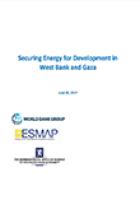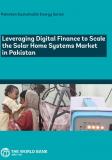Publications
The Palestinian Territories face significant energy security challenges, already severe in Gaza, but also emerging in the West Bank. In Gaza, the available power supply only meets half the demand leading to rolling blackouts, alternating between 8 hours on and 8 hours off. Although the West Bank generally enjoys 24-hour power supply, there have been emerging power shortages during peak winter and summer months. With Palestinian electricity demand projected to grow at an average annual rate of around 3.5 percent for the coming years, a little faster in Gaza and slower in the West Bank, energy shortages can be expected to deteriorate unless new supply options are found. Both Jordan and Egypt have recently overcome interlinked power supply crises caused by a shortage of Egyptian gas, and are now heading for significant power surpluses. In principle, existing interconnection capacity of 20 MW with Jordan and 20-30 MW with Egypt could be upgraded to support higher volumes of imports. However, Jordanian electricity is currently more expensive than Israeli power due to heavy reliance on LNG, but is expected to become cheaper as Israeli gas enters the Jordanian market and renewables increase their share in the Jordanian generation portfolio.
On the other hand, the size of Jordan’s power system is on par with the size of Palestinian electricity demand, meaning that the amount of power available for export may not be so large relative to Palestinian needs. Egyptian power is currently cheaper than Israeli power due to the historic low cost of natural gas; however, the size of the Egyptian power system is 30 times larger than the Palestinian demand making it relatively easy for Egypt to supply the scale of power that West Bank and Gaza might need. Nevertheless, historical imports from Egypt into Gaza (which have been managed through a local Egyptian distribution company rather than the national Egyptian transmission operator) have proved unreliable due to security issues in Sinai. In addition, Gaza has not yet established any payment record with Egypt since the cost of these imports has been covered by third party benefactors to date. Finally, neither Jordan, nor Egypt have access to the controversial "net lending" mechanism that has so far provided Israel with an informal payment security mechanism to at least partially offset any payment risk from Palestinian consumers.
World Bank Group. 2017. Securing Energy for Development in West Bank and Gaza. World Bank, Washington, DC. © World Bank. https://openknowledge.worldbank.org/handle/10986/28468 License: CC BY 3.0 IGO. https://openknowledge.worldbank.org/handle/10986/28468


